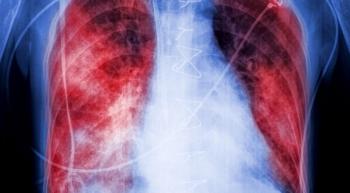
For years, many health care professionals noticed that patients with myeloproliferative neoplasms (MPNs) tend to experience thrombosis more than the average person. Now, a recent population-based study conducted in Sweden confirmed their suspicions.

Brielle Benyon, Assistant Managing Editor for CURE®, has been with MJH Life Sciences since 2016. She has served as an editor on both CURE and its sister publication, Oncology Nursing News. Brielle is a graduate from The College of New Jersey. Outside of work, she enjoys spending time with family and friends, CrossFit and wishing she had the grace and confidence of her toddler-aged daughter.
Follow Brielle on Twitter @Brielle_Benyon.

For years, many health care professionals noticed that patients with myeloproliferative neoplasms (MPNs) tend to experience thrombosis more than the average person. Now, a recent population-based study conducted in Sweden confirmed their suspicions.

Lung cancer is the leading cause of cancer-related death for women in the United States, but often does not get as much attention as other malignancies. In an effort to change that, and to one day decrease the number of women who are dying from the disease, the bipartisan Women and Lung Cancer Research and Preventative Services Act was reintroduced into Congress.

Now that a number of immunotherapy agents have been approved in the bladder cancer space, identifying and managing the toxicities that may come along with them is critical.

While causes for pneumonia were varied – including bacteria (14 percent), virus (22 percent) and unspecified (64 percent) – the majority of children did not have immune deficiencies recorded at the time of their pneumonia diagnosis.

For years, former Vice President Joe Biden’s son, Beau, was stationed near large, potentially toxic burn pits. After Beau died of glioblastoma (GBM) in May 2015, Joe Biden grew skeptical and started to question if the burn pits contributed to his son’s cancer diagnosis.

Health care practitioners were surprised when they saw 10 cases of a very rare cancer in the New York City area. As it turned out, most of the patients weren't originally from New York.

Not all patients with non-small cell lung cancer (NSCLC) respond to immunotherapy, so researchers are exploring the use of combination regimens, including immune checkpoint inhibitors and chemotherapy, to improve outcomes in these patients.

Until recently, Herceptin, which is used to treat patients with metastatic breast cancer, was fully covered under Humana’s South Florida Medicare Advantage plans. But, after taking it off the preferred drug list, patients will now be responsible for 20 percent of the drug’s cost, better aligning South Florida’s plans with Humana’s other Medicare Advantage plans.

The success of CAR- (chimeric antigen receptor) T cell therapy is causing landmark change in the way that patients with multiple myeloma are being treated, but more research needs to be done to better understand the role that these agents will play.

The identification of microsatellite status, tumor mutational burden and protein expression in colorectal cancer (CRC) tumors may lead to better outcomes in a subgroup of patients.

Why do some pediatric ALL survivors live the rest of their lives cancer-free, while others face secondary cancers or death?

Safety net hospitals exist to offer care to vulnerable populations, such as those on Medicaid or who are uninsured. However, these patients still face barriers to care that affect survival outcomes.

The Food and Drug Administration (FDA) granted priority review to the combination use of Darzalex (daratumumab), Velcade (bortezomib), melphalan and prednisone for the treatment of newly diagnosed patients with multiple myeloma who are not eligible for autologous stem cell transplant (ACST).

While the treatment of leukemia has greatly advanced since 1946, so has the organization. In the past seven decades, LRF has raised more than $75 million for its mission of conquering not only leukemia, but all blood cancers.

Research constantly highlights how adequate sleep impacts health outcomes. A recent meta-analysis, published in Cancer Epidemiology, Biomarkers & Prevention, delved in a bit further to see if people who stayed up all night for work had an increased chance of developing cancer.

So, wouldn't it be nice to have a quantitative way to say how deep the remission is? Historically, it’s been felt that if you just scratch the surface and get below the 5 percent blast level, you’re probably going to relapse. And if you get deeper, you might not.

In recent years, next-generation sequencing has allowed physicians and researchers alike to gather more genetic data for patients with gastrointestinal cancers. And while this kind of profiling continues to advance, so do treatment options for this patient population.

Traditionally, desmoplastic melanoma was difficult to treat because the tumor tissue is so dense. However, researchers just discovered that immunotherapy agents have potential in this space.

Parts of the Northeast had a foot or more of snow last week. What should patients do when their scheduled cancer treatment falls in the middle of a snow storm?

Racial and socioeconomic status disparities can affect all types of lung cancer treatment – including surgery, chemotherapy and radiation. However, researchers may not be aware of this, since many of these groups are underrepresented in lung cancer clinical trials.

To date, trials testing the use of immunotherapy in the treatment of ovarian cancer yielded disappointing results. However, researchers are not giving up. Instead, they’re investigating to see if immunotherapy drugs – such as PD1 and PDL-1 inhibitors – can be combined with other agents to benefit patients.

NextSource Pharma, a small pharmaceutical company based in Florida, acquired the drug lomustine from Bristol-Myers Squibb, changed its brand name to Gleostine, and changed the price – by about 1,400 percent.

A drug commonly used to treat patients with multiple myeloma may lead to an increased risk of cardiovascular events such as heart attacks, according to recent research conducted at the Abramson Cancer Center of the University of Pennsylvania.

“As the population of cancer survivors continues to grow, so does the importance of addressing the long-term sequelae of cancer treatment,” the authors wrote. “This hearing loss can result in multifaceted decrease in quality of life, and in pediatric patients it can impact social and academic development.”

Smartphones and fitness trackers could serve an unmet need when it comes to valuable patient-reported symptoms, improving long-term monitoring of people who are going through cancer treatment.


The Rapunzel Project is dedicated to spreading the word about hair-preserving treatments for patients undergoing chemotherapy.

While patients with chronic lymphocytic leukemia (CLL) tend to have long life expectancies, with many prescribed to a “watch-and-wait” approach, a recent study by the Cancer Support Community (CSC) found that more than half of patients living with the disease reported that having CLL affects their viewpoints regarding their life expectancy.

Not all employees with cancer get paid leave, but those who did saw better health and financial outcomes.

Optune is a method of treatment where adhesive patches are applied to the patient’s scalp. The patch transductors deliver low-intensity electric fields – called Tumor Treating Fields – that stop the growth and division of GBM cells.